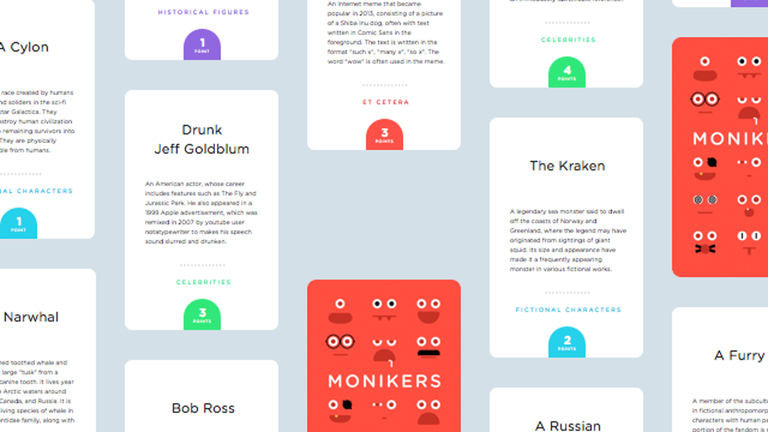
Me: Hey, are you ready? It's our turn. Uh... A this guy and his brother were a video game from the 80's?
You: (confused look)
Me: (panicking as I see we have 10 seconds left) Uh... They go through green pipes. They throw fireballs. Italian plumbers fighting Bowser....
Comparing Monikers to Charades is like comparing a Happy Meal to filet Mignon, like comparing Twilight to Shakespeare, like comparing Picasso to a child's drawing. And yet, the comparison is inevitable. Like Charades, Monikers is basically a game that centers around a hint giver that must get their team to make a correct guess. But any similarities pretty much end there.

In Monikers, two teams of two to eight (or more) a piece go through three rounds in which the rules for getting your team to guess are different. But before that, each player is given ten cards from the player deck from which they secretly choose five that they like. When playing for the first time, I found that a few players were dismayed at being familiar with almost none of their cards. Monikers has a way of making up for this, which I'll talk about in a second.
After each player has selected their five cards, the cards are added to a single deck.
The team to go first is the one with the team member who has the best famous person story (the rules say you can also choose randomly). The beauty of Monikers is that all of the cards feature the name of a character, title, or real person, so unlike charades it won't just be something random.

Moreover, as previously stated, each game is split into three rounds. In the first round, players may use any words, sounds or gestures (except for words that are part of the thing you are trying to get your team to guess, obviously). In the second round, you can use only one word as a clue. The last round is just charades.
In the third round you can only use your body and basic sounds (no words).
It sounds hard, but there's an elegance that happens in the rounds. The reason? Remember, you use the same deck for all three rounds. So players begin to learn the deck and can more easily guess the words. This is a game that is definitely tons more fun than it sounds. So, without further ado:
Buy If:
You want a large group game that people of all ages will enjoy. The box recommends a minimum age of 17 and this is probably accurate as each person must have at least a basic knowledge of modern culture to get the answers. Heck, if you're a real cheap skate the game is actually available online for free here (you'll have to print it out and cut it out). But, c'mon. It generally costs under 20 bucks online for a nice version that's going to last you much longer than anything you make.
Don't Buy If:
You're looking for an intense, board game-y experience like with Cosmic Encounter, Star Realms, or Quantum. This is a casual party game that will satisfy a wide range of people, but it's certainly not going to scratch that strategy itch you've been having.
Thanks for reading! If you enjoyed this article be sure to comment to let me know you want more like it! If you found it at all useful, do me a favor and upvote! And, if you thought it was really great, resteem! Thank you, and as always, these posts buy new board games!

Such a great game! And your review is pretty spot on. The comparison to Charades is inevitable, but so inadequate. This game was like Charades on steroids, and I was surprised (but also not surprised at the same time?) at the amount of fun I had playing it! (That come-from-behind win helped, too. :P)
Haha. Yeah, even though I was pretty irked, it was still super fun and I cannot wait to play it, again.
Well, you handled being irked with a significant amount of grace. :) I can't wait to play again, too!
Oh, and forgot to say earlier -- this is available online for FREE?! I checked out that link. What?! How is that even possible! And it's neatly done on a PDF, too. Color me surprised.
This post has received a 0.37 % upvote from @buildawhale thanks to: @jenkinrocket. Send at least 1 SBD to @buildawhale with a post link in the memo field for a portion of the next vote.
To support our daily curation initiative, please vote on my owner, @themarkymark, as a Steem Witness